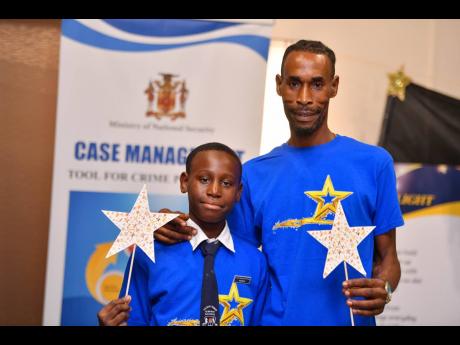Case management strategy programme changing lives
The Ministry of National Security's (MNS) Case Management Strategy Programme is being hailed as a transformational violence prevention and social intervention tool.
This initiative represents a departure from using the physical presence of law enforcement in communities impacted by crime and violence as a primary deterrent and, instead, delving deeper into the root causes and creating specific strategies to rectify them. Senior Case Management Coordinator in the ministry, Orville Simmonds, told JIS News that the strategy is a framework tool focused on empowering persons, especially young people deemed at risk of being perpetrators of crime and violence.
"It takes into consideration all the different drivers of crime and violence, and through a very deliberative approach of using empirical testing instruments, the ministry seeks to identify those persons who may be at risk of committing acts of crime and violence, and through a case management approach, we work with them," he outlined.
Through a partnership with the Ministry of Education, Skills, Youth and Information, more than 30 schools located within zones of special operations (ZOSOs) in Kingston, St James and St Andrew have been identified to receive case management assistance. Simmonds explained that the process begins when the guidance counsellor identifies students that have high levels of disruptive or antisocial behaviour and then refers them to the case management team.
"Students are then assessed by the MNS case management team, and the necessary support and intervention is provided," he added.
Leroy Forbes and his 10-year-old son, Jaylee, who reside in the ZOSO community of Denham Town in Kingston Western, are among the persons who have participated in the case management programme. Forbes said the intervention has helped bridge the gap in their relationship.
"Before, I wasn't such a good dad. I spent less time with my [son] because most of us are garrison dads, [and] we spend more time out there hustling. So most times when our kids need us, we are not there. I used to shun my son and I didn't listen to him. Sometimes [when] he [wanted] to explain something... really important, I would shun him," Forbes said. He said the case management team's intervention transformed his relationship with Jaylee, " [so] I don't do that any more".
"They definitely inspired us to be role models for our kids, for our families and the entire community. I learned to listen to my son. Now I realise that if you just give him a minute to talk, it would be better," he added. Forbes said he now has a positive perspective of the Ministry of National Security, pointing out that it inspired him to "show up" for his son.
"Usually, [only] his mother would attend certain things with him. I [now take] the time to come and support him. So he knows I am dedicated, and I am here for him in every way. His whole attitude is better, and I see leadership skills in him," the doting father stated.
Forbes offered some advice to other parents, especially fathers in his community, who may have experiences similar to his.
"If you can get involved, get involved. Every father should be a role model, be in your kids' life, be a father. We are the head cornerstone, we are the person who they need most to be successful, so be there for your kids," he said. Jaylee said that he is now better able to control his anger and has since been made a prefect at his school, St Alban's Primary and Infant in Kingston.
"I used to have a lot of anger, because if my friends pushed me, I would get angry and fight. But after going through the programme, I know the difference... there is good touch and bad touch. My teachers see that there is a change in my behaviour and, as you can see, school is going [well] because I am now a prefect," he said. However, Jaylee said the greatest outcome for him is the strong positive relationship he now shares with his father.
"My dad doesn't 'cuss' me any more; sometimes we have fun in the house and watch movies and talk," he said.






































